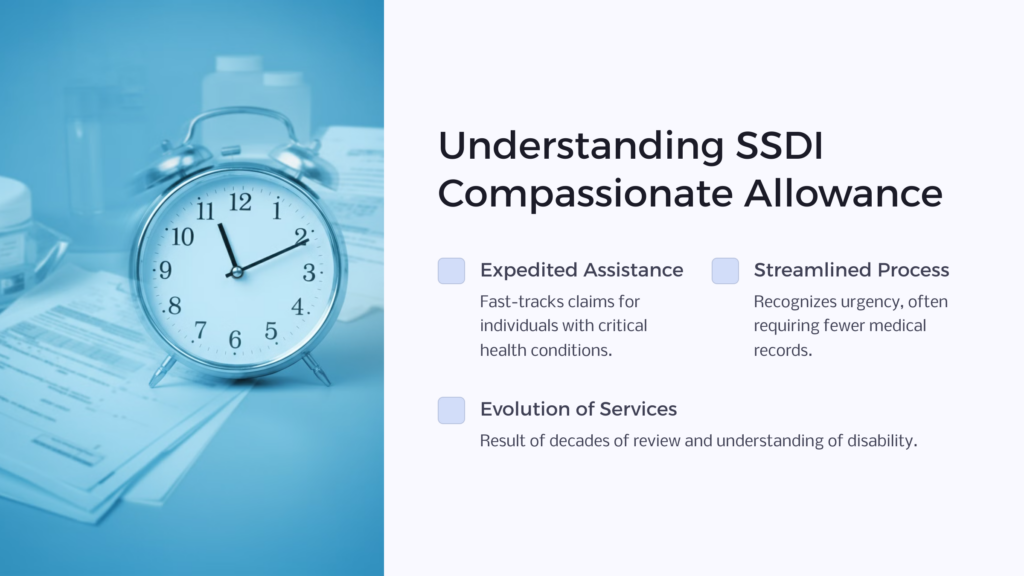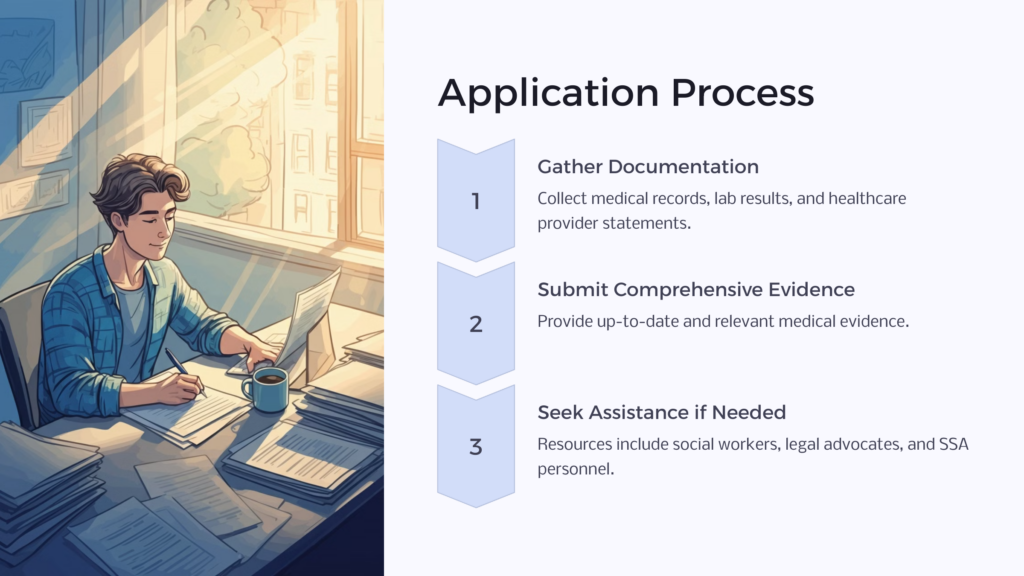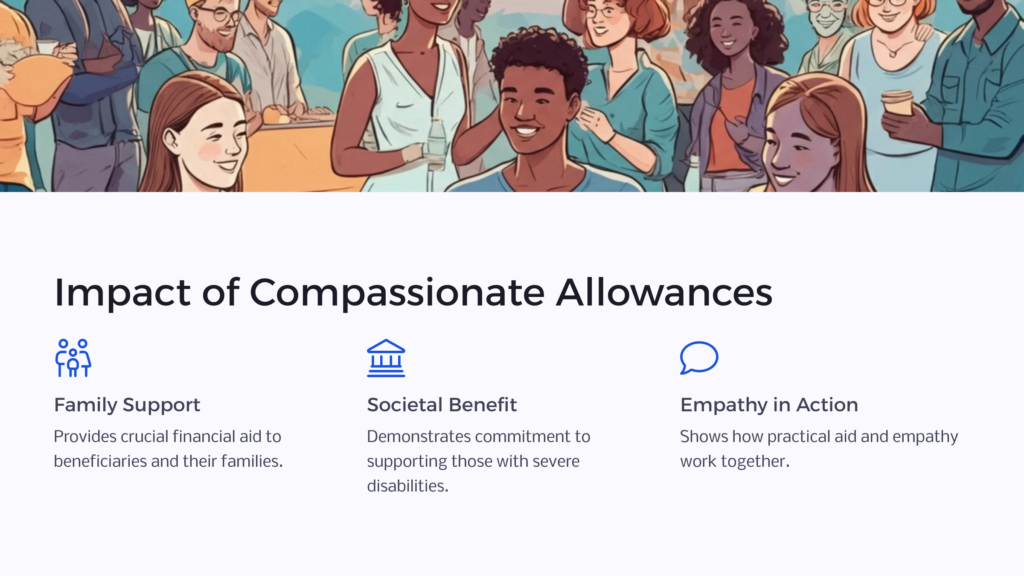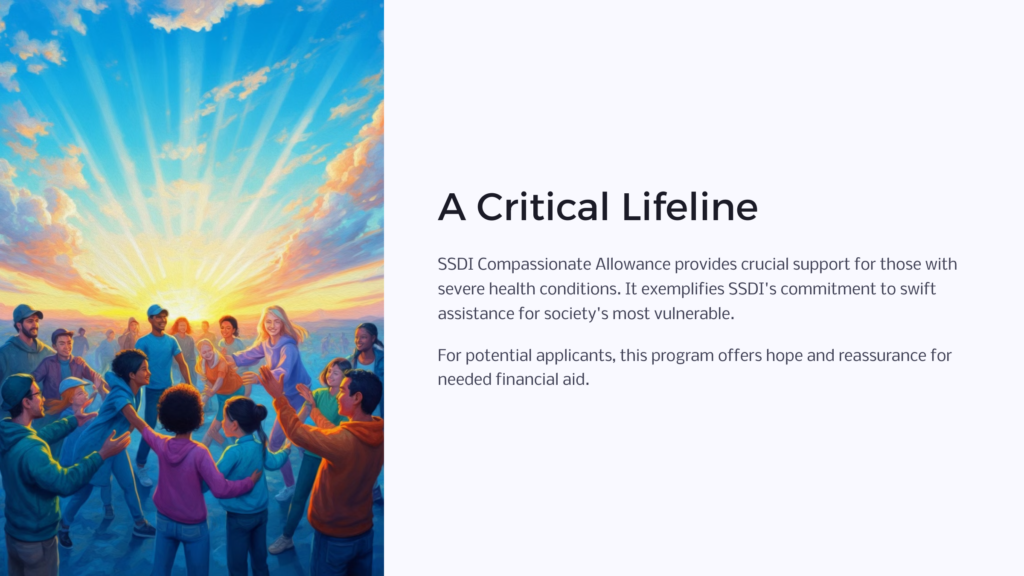The Social Security Disability Insurance (SSDI) plays a crucial role in providing financial aid to individuals incapable of acquiring sufficient income due to debilitating illnesses or impairment. Founded on the tenets of empathy and aid, SSDI upholds the essence of social security, providing a financial safety net to injured or ill workers who are unable to continue gainful employment.
The importance and purpose of SSDI lie in its ability to support these individuals, offering help when regular income becomes an impossibility due to disability. The introduction of the SSDI Compassionate Allowance represents an evolution of these services, extending special provisions to those with critical health conditions.
What is SSDI ‘Comprehensive Allowance’?

The Compassionate Allowance program, based on the SSDI, offers expedited assistance to individuals suffering from certain extreme medical conditions. This form of allowance differs from the regular SSDI as it uses a streamlined process to fast-track social security disability claims, recognizing the urgency of providing financial aid to individuals with a critical condition.
Decades of continuous review and an evolving understanding of disability led to the formation of Compassionate Allowance. The theory behind its inception centers around providing expedited assistance, ensuring that individuals with life-threatening conditions receive their benefits swiftly, often without the need for a full complement of medical records.
Who qualifies for the SSDI Compassionate Allowance?
SSDI Compassionate Allowance recipients must meet specific qualifications and requirements. These qualifications hinge upon the severity of the individual’s condition, and whether it is included in the specific list of diseases or disorders recognized under the SSDI Compassionate Allowance.
The current list contains over 200 conditions, ranging from various cancers and neurodegenerative disorders, to certain rare genetic disorders, each one automatically qualifying due to their severity. For example, victims of terminal cancer or people living with diseases like ALS have used Compassionate Allowances to fast-track their claims, enabling quicker access to much-needed social security disability benefits.
The Application Process for SSDI Compassionate Allowance

SSDI Compassionate Allowance recipients must meet specific qualifications and requirements. These qualifications hinge upon the severity of the individual’s condition, and whether it is included in the specific list of diseases or disorders recognized under the SSDI Compassionate Allowance.
The current list contains over 200 conditions, ranging from various cancers and neurodegenerative disorders, to certain rare genetic disorders, each one automatically qualifying due to their severity. For example, victims of terminal cancer or people living with diseases like ALS have used Compassionate Allowances to fast-track their claims, enabling quicker access to much-needed social security disability benefits.
Benefit Calculation
Quantifying the amount an individual can receive through Compassionate Allowances depends upon their lifetime earnings subject to Social Security taxes. The calculation uses the average indexed monthly earnings (AIME), applying a formula that consists of fixed percentages at different levels of income.
To illustrate, consider an individual who worked for 25 years, contributing to Social Security but was diagnosed with a severe terminal medical condition. Based on their wages, the SSDI benefits may grant a substantial monthly allocation to ensure they receive the support they need.
The Impact of Compassionate Allowances

Compassionate Allowances significantly improve the lives of beneficiaries and their families. For instance, a young father diagnosed with an aggressive form of cancer was able to fast-track his disability claim through Compassionate Allowances, and his social security disability benefits then provided crucial financial support to his family during a difficult period.
Beyond individual beneficiaries, this program positively affects societal structures as a whole. It underscores the commitment to support those with severe disabilities or illnesses, demonstrating how empathy and practical aid can work in tandem.
Common Misunderstandings about Compassionate Allowances
Several misunderstandings and myths surround the Compassionate Allowances program. A common one is that receiving an allowance automatically qualifies one for free medical care. In fact, while the allowance helps cover living costs, it does not translate to automatic, free healthcare.
Similarly, it is also a myth that you can ‘quick-apply’ without supporting documents or evidence. While quick disability determination is expedited, the process still necessitates rigorous application with comprehensive medical records to qualify.
Final Thoughts

Summarizing, the SSDI Compassionate Allowance serves as a critical lifeline for people suffering from severe health conditions. This program highlights the SSDI’s commitment to providing expedited assistance to the most vulnerable of society. For individuals considering applying for social security Compassionate Allowance, the prospect of receiving needed financial aid should instill hope and reassurance.
Check us out at Benefits.com and take our quiz so we can get started helping you on your path to receiving benefits.
 Benefits.com Advisors
Benefits.com Advisors
With expertise spanning local, state, and federal benefit programs, our team is dedicated to guiding individuals towards the perfect program tailored to their unique circumstances.
Rise to the top with Peak Benefits!
Join our Peak Benefits Newsletter for the latest news, resources, and offers on all things government benefits.




















